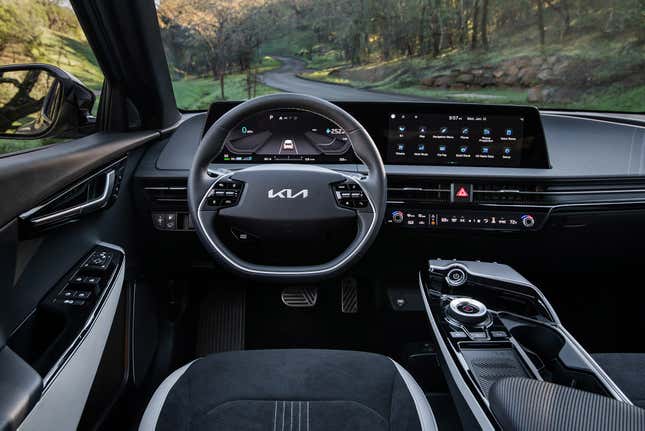Here's How the Inflation Reduction Act Is Kneecapping Hyundai and Kia's EV Sales

The Hyundai Ioniq 5 honestly couldn’t have asked for a better first six months on the market last year. The cyberpunk bulldog-faced electric SUV totaled 15,670 sales from January through July of 2022. One Edmunds analyst quoted by Bloomberg in a story dated June 25 told the business site that “from an EV perspective, [Hyundai’s] really just kind of cleaning the floor.” The tipping point was but a few days away.
Outdated Air Traffic Technology Is Plaguing Your Travel
For the remaining five months of the year, Hyundai moved just 7,312 examples of the Ioniq 5. The downturn coincided with the arrival of the Inflation Reduction Act in August, which eliminated the model’s eligibility for $7,500 in federal tax incentives overnight because it’s assembled in South Korea, not the U.S. It’s impossible to precisely quantify the harm losing a break like that has on an EV’s success, but the Ioniq 5’s rollercoaster U.S. sales chart — and relative triumph in Europe — indicates Hyundai has every reason to be peeved.
Lately, Ioniq 5 numbers have been trending up somewhat, according to data from CarFigures. February saw the EV’s first month of more than 2,000 deliveries since June of last year, which still holds the record at 2,853 registrations. From 2,074 cars in February to 2,114 in March and most recently 2,323 in April, it would seem that the Ioniq 5 is navigating the regulatory challenge facing it about as well as Hyundai could hope.
Trouble is, those numbers have been somewhat goosed, Hyundai will readily admit, by the brand pushing leasing over financing as of late. That’s because leases aren’t subject to the same IRA manufacture origin requirements that normal sales are. Hyundai Motors North America CEO Jose Muñoz acknowledged this in a brief interview with Automotive News back in mid-April, around the time of the New York Auto Show:
“We’ve tried to maximize the utilization of the so-called 45W paragraph, which allows for sales through the lease channel to benefit from the $7,500 tax advantage,” Muñoz said at this month’s New York auto show. Despite being early to market and enjoying robust sales, Hyundai EVs slipped in market share from 3.5 percent at the end of 2022 to 3.1 percent through February this year, according to registration data from Experian. […]
“We believe the consumers are the ones who are losing because they will not be able to benefit other than a lease,” he said, noting that Hyundai estimates that leasing represents only about 10 percent of the EV segment across the industry.
“We are not competing in 90 percent of the segment, so it’s a big handicap,” he said.
Per the Bureau of Transportation Statistics, “new vehicle leases are sold by the dealer to a finance company that manages the lease, causing them to be included by default in most car sales figures.” Hyundai reports leases as sales, like any automaker. Couple that with Hyundai’s own data cited in that Auto News article that leases represented 27 percent of all its EV sales in the first quarter of 2023 — compared to just 5.5 percent throughout 2022 — and the Ioniq 5’s recent bounce back suddenly doesn’t seem quite as impressive as the numbers might lead on.
Image: Kia
The story’s worse for the Kia EV6 — the Ioniq 5’s E-GMP platform-mate with a swoopier body. In March of 2022, Kia moved 3,156 of them, topping even the Ioniq 5’s best-performing month ever by some 300 cars. Then, in much the same way, sales dropped off a cliff in July, dipping from 2,567 to 1,716 before crashing as far down as 641 cars for the month of November.
However, while the Ioniq 5 began to recover in the early months of 2023, the EV6 continued to languish. All but 988 EV6s found homes this past March — a 68 percent drop against the same period last year, and also 53 percent worse than the Ioniq 5 sold over that span in 2023. And it’s not like Kia isn’t pushing similar incentives to Hyundai. Right now, the EV6 is advertised with “$7,500 Lease Bonus Cash” online. Both brands, to their credit, are also currently taking $3,750 off retail for certain trims of each model.
The picture seems rosier in Europe. Hyundai has been pleased with the Ioniq 5’s ability to woo customers of more premium brands on the opposite side of the pond, while Hyundai and Kia combined for EV market share beyond 10 percent in 10 European markets last year. Here in the U.S., their individual shares of new EV registrations declined to 3.1 and 2.3 percent in this past quarter, respectively.

Image: Kia
The modest first-quarter bump aside, the Ioniq 5’s pace is way off its blistering debut last year. If nothing else, Hyundai has been able to lean on the Kona Electric in recent weeks — the least-expensive EV the company sells in the U.S., that undercuts the $42,000 Ioniq 5 by some $8,000. The Kona Electric just sold a whopping 190 percent better than it had at the beginning of 2022. It’s almost like people want — perhaps even need — a more affordable way to get into Hyundai and Kia’s EVs.
Unfortunately for the automaker as well as its customers, that’s going to take some time. The company’s forthcoming EV plant in Georgia, which will eventually grant it access to those sweet IRA tax credits, won’t be ready until January 2025 at the earliest.



